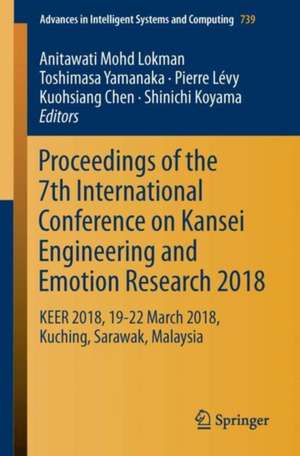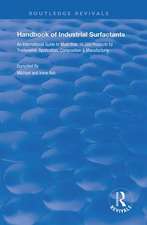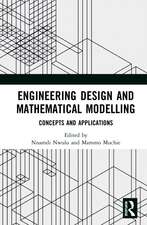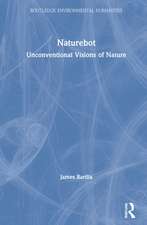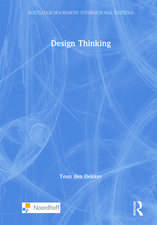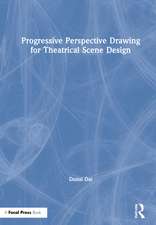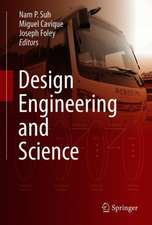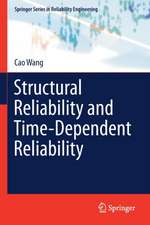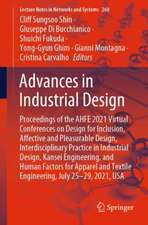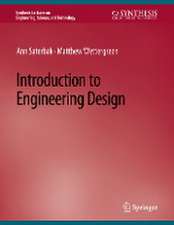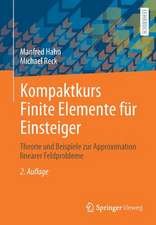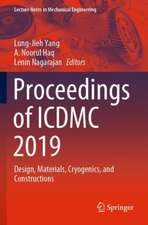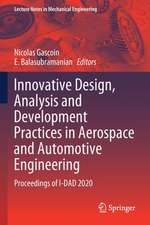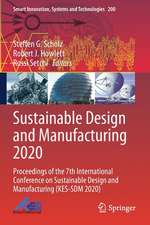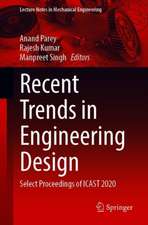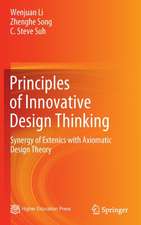Proceedings of the 7th International Conference on Kansei Engineering and Emotion Research 2018: KEER 2018, 19-22 March 2018, Kuching, Sarawak, Malaysia: Advances in Intelligent Systems and Computing, cartea 739
Editat de Anitawati Mohd Lokman, Toshimasa Yamanaka, Pierre Lévy, Kuohsiang Chen, Shinichi Koyamaen Limba Engleză Paperback – 14 mar 2018
The proceedings gather a selection of refereed papers presented at the 7th International Conference on Kansei Engineering and Emotion Research 2018 (KEER 2018), which was held in Kuching, Malaysia from 19 to 22 March 2018.
The contributions address the latest advances in and innovative applications of Kansei Engineering and Emotion Research. The subjects include:
The contributions address the latest advances in and innovative applications of Kansei Engineering and Emotion Research. The subjects include:
- Kansei, Emotion and Games Kansei, Emotion and Computing
- Kansei, Emotion and Wellbeing / Quality of Life
- Kansei, Emotion and Design
- Kansei, Emotion and Health / Ergonomics
- Kansei, Emotion and Multidisciplinary Fields
- Kansei, Emotion and Culture
- Kansei, Emotion and Social computing
- Kansei, Emotion and Evaluation
- Kansei, Emotion and User Experience
Din seria Advances in Intelligent Systems and Computing
- 20%
 Preț: 1120.90 lei
Preț: 1120.90 lei - 20%
 Preț: 1090.59 lei
Preț: 1090.59 lei - 20%
 Preț: 1324.07 lei
Preț: 1324.07 lei - 20%
 Preț: 1989.79 lei
Preț: 1989.79 lei - 20%
 Preț: 1946.92 lei
Preț: 1946.92 lei - 18%
 Preț: 1273.28 lei
Preț: 1273.28 lei - 20%
 Preț: 2264.51 lei
Preț: 2264.51 lei - 20%
 Preț: 1337.27 lei
Preț: 1337.27 lei - 20%
 Preț: 1297.67 lei
Preț: 1297.67 lei - 20%
 Preț: 1315.82 lei
Preț: 1315.82 lei - 20%
 Preț: 1310.88 lei
Preț: 1310.88 lei - 20%
 Preț: 1302.62 lei
Preț: 1302.62 lei - 20%
 Preț: 882.20 lei
Preț: 882.20 lei - 20%
 Preț: 1305.93 lei
Preț: 1305.93 lei - 20%
 Preț: 1629.32 lei
Preț: 1629.32 lei - 20%
 Preț: 1345.49 lei
Preț: 1345.49 lei - 18%
 Preț: 1227.52 lei
Preț: 1227.52 lei - 18%
 Preț: 1290.64 lei
Preț: 1290.64 lei - 20%
 Preț: 1041.10 lei
Preț: 1041.10 lei - 20%
 Preț: 1034.52 lei
Preț: 1034.52 lei - 20%
 Preț: 1298.50 lei
Preț: 1298.50 lei - 20%
 Preț: 1330.67 lei
Preț: 1330.67 lei - 20%
 Preț: 1483.28 lei
Preț: 1483.28 lei - 20%
 Preț: 1971.64 lei
Preț: 1971.64 lei - 20%
 Preț: 1006.48 lei
Preț: 1006.48 lei - 20%
 Preț: 1471.75 lei
Preț: 1471.75 lei - 20%
 Preț: 1471.56 lei
Preț: 1471.56 lei - 20%
 Preț: 1454.40 lei
Preț: 1454.40 lei - 20%
 Preț: 1494.84 lei
Preț: 1494.84 lei - 20%
 Preț: 1269.64 lei
Preț: 1269.64 lei - 20%
 Preț: 1481.64 lei
Preț: 1481.64 lei - 20%
 Preț: 1192.08 lei
Preț: 1192.08 lei - 20%
 Preț: 1298.50 lei
Preț: 1298.50 lei - 20%
 Preț: 1489.07 lei
Preț: 1489.07 lei - 20%
 Preț: 825.78 lei
Preț: 825.78 lei - 20%
 Preț: 1649.93 lei
Preț: 1649.93 lei - 20%
 Preț: 1463.49 lei
Preț: 1463.49 lei - 20%
 Preț: 1438.77 lei
Preț: 1438.77 lei - 20%
 Preț: 1474.22 lei
Preț: 1474.22 lei - 20%
 Preț: 1298.50 lei
Preț: 1298.50 lei - 20%
 Preț: 1327.35 lei
Preț: 1327.35 lei - 20%
 Preț: 1973.31 lei
Preț: 1973.31 lei - 18%
 Preț: 947.04 lei
Preț: 947.04 lei - 18%
 Preț: 1441.39 lei
Preț: 1441.39 lei - 20%
 Preț: 638.55 lei
Preț: 638.55 lei - 20%
 Preț: 1320.76 lei
Preț: 1320.76 lei - 20%
 Preț: 1948.56 lei
Preț: 1948.56 lei
Preț: 1246.47 lei
Preț vechi: 1520.07 lei
-18% Nou
Puncte Express: 1870
Preț estimativ în valută:
238.59€ • 259.25$ • 200.54£
238.59€ • 259.25$ • 200.54£
Carte tipărită la comandă
Livrare economică 22 aprilie-06 mai
Preluare comenzi: 021 569.72.76
Specificații
ISBN-13: 9789811086113
ISBN-10: 9811086117
Pagini: 893
Ilustrații: XXII, 902 p.
Dimensiuni: 155 x 235 mm
Greutate: 1.27 kg
Ediția:1st ed. 2018
Editura: Springer Nature Singapore
Colecția Springer
Seria Advances in Intelligent Systems and Computing
Locul publicării:Singapore, Singapore
ISBN-10: 9811086117
Pagini: 893
Ilustrații: XXII, 902 p.
Dimensiuni: 155 x 235 mm
Greutate: 1.27 kg
Ediția:1st ed. 2018
Editura: Springer Nature Singapore
Colecția Springer
Seria Advances in Intelligent Systems and Computing
Locul publicării:Singapore, Singapore
Cuprins
Part 1: Kansei, Emotion, and Games.- chapter 1. A Fundamental Study of a Computer Player Giving Fun to the Opponent -Targeting Hanafuda, a Card Game in Japan.- chapter 2. Exploring the Critical Appeal of Mobility-Augmented Reality Games.- chapter 3. Interactive Games Effects on Children's Affective Cooperation: Evaluating Cooperation Through Kansei-Based Play and Design Sections.- chapter 4. Kansei Engineering Approach in Designing Appealing Computer Animation Character.- chapter 5. The Content and Design of Art Museum On-line Learning Games for Children.- chapter 6. Understanding of User's Gameplay Behavior and Perception Styles in an Environment of Digital Gesture Based-Game.- Part 2: Kansei, Emotion and Computing.- chapter 7. A Smart Home Model Using Android Application.- chapter 8. A State of Art on Kansei-Engineered Virtual Shops: A Study on the Possibilities of V-Commerce.- chapter 9. A System Analysis and Design for SMEs Product Presentation in Ecommerce Website Based on Kansei Engineering (Case Study: SMEs Products of Ponorogo Regency).- chapter 10. Accuracy of Geolocation Data of Taman Wetland Putrajaya.- chapter 11. Brand Name Decision AI System.- chapter 12. Development of Virtual Draping System by Augmented Reality.- chapter 12. Just in Mobile Augmented Reality Technology (JIMART) Application.- chapter 13. Virtual Agent Design Factors for the 21St Century Learners: A Kansei Approach.- Part 3: Kansei, Emotion and Wellbeing / Quality of Life.- chapter 14. Conceptualization of Happiness Index Model.- chapter 15. Factorization of Accomplishment Domain of PERMAI Model.- chapter 16. From PERMA to PERMAIg©: Happiness Instrument Development.- chapter 16. Happiness Index Measurement: Application of Kansei Engineering and Positive Psychology.- chapter 17. Measuring Employee Happiness: Analyzing the Dimensionality of Employee Engagement.- chapter 18. Modeling Factors and Importance of Happiness Using KJ Method.- chapter 19. Relationship Between Workers' GeneralHappiness and Emotional Components @ PERMAIg©.- chapter 20. Reliability of Happiness Index Model Questionnaire.- chapter 21. Visual Analytics of Happiness Index in Parallel Coordinate Graph.- Part 4: Kansei, Emotion and Design.- chapter 22. A Study for Application of Color Design in Product Design of Woodworking Machine Tooltitle.
Notă biografică
Assoc. Prof. Dr. Anitawati Mohd Lokman is Associate Professor at the Faculty of Computer and Mathematical Sciences, Universiti Teknologi MARA (UiTM), Malaysia. She received a Bachelor of Engineering in Information Engineering from the University of Fukui, Japan in 1994, and Master degree in Information Technology from UiTM in 2001. She earned her PhD in Science, with a concentration on Kansei Engineering and Emotional User Experience under the supervision of Professor Mitsuo Nagamachi and Professor Nor Laila Md Noor. She champions Kansei Engineering in Malaysia, entrusted with the knowledge by her Guru, via collaboration in research projects, co-author of books and research articles, as well as sharing medium of knowledge transfer in workshops and tutorials locally and internationally. She has also been a keynote speaker to a few international conferences and seminars. With encouraging response to the discipline, she founded Malaysia Association of Kansei Engineering (MAKE) in 2015, and appointed as the first president. She is also the Head of Research Intensive Group for Kansei/Affective Engineering (RIG KAE) in UiTM. She is known in the academia locally and internationally, and encouragingly become a reference expert in the field of Kansei Engineering, Emotion, Wellbeing, Quality of Life, Interface Design, Interaction Design, Product/Service Design, and Branding. She is currently active in converging Kansei Engineering to diverse field such as in Emotive Web, Culture & Design, Social Media, Pubic Service, Robot Interaction, and Emerging Internet Applications. She has authored over 100 publications at local and international level, in the form of books, conference papers and journals among others. Among recognitions she received are the Best Author of UiTM Award 2016, and honoured as Senior Member of the IEEE. She was also awarded with 30 Women Achievers & Leaders of Malaysia 2017 presented by Tan Sri Datin Paduka Hajah Zaleha Ismail, on behalf of CHRO Asia.
Prof. Dr. Toshimasa Yamanaka is currently an Executive Officer at the University of Tsukuba, Japan, and also a Provost and Professor at the Faculty of Art and Design at the same university. He teaches undergraduate and graduate courses in Product Design and Kansei Information. He earned his PhD in Kansei Science from the Graduate School of Comprehensive Human Sciences of the University of Tsukuba. Prof. Dr. Toshimasa Yamanaka has been appointed as a member of the Board of Directors of various local public and private sectors, and juries of various local and international bodies including Associate President, Executive Board of International Congress of the International Association of Societies of Design Research (2013), Executive Board Member of International Association of Universal Design (2013-present), Jury at the Kid’s Design Awards (2014-present), President of the Japanese Society for the Science of Design (2012-2016), Advisor of the Japan Society of Kansei Engineering (2011-present), Board member of the International Association of the Societies of Design Research (IASDR) (2005-present), Executive Board member of the Kansei Engineering and Emotion Research (KEER) (2007-present) and Jury at the Good Design Awards (2001, 2003). He also received several Good Design Awards, especially for PENTAX, such as PENTAX PocketBook mobile printer (1996), PENTAX ZOOM 105 (Compact camera) (1989), PENTAX LaserprinterLaserFold 240 (1989), PENTAX 7x21 DCF II-R binocular (1988), PENTAX Telescope 105 EDHF System (1987), PENTAX Telescope 75 EDHF-II System (1987), PENTAX 7x20 DCF II Binocular (1987), PENTAX Telescope 125 EDHF System (1985), and PENTAX 7x21 DCF-HD Binocular (1985). He is author of over 100 publications at international conferences and journals. His research areas of interest include design process, design analysis and information design.
Ir. Dr. Pierre (P.D.) Levy is currently an Assistant Professor at Eidhoven University of Technology, as well as President of European Kansei Group and Coordinator of the KEER steering committee. He graduated from Mechanical Engineering (specialty in Industrial Design) in Compiègne University of Technology, France (2001), and gained a PhD with honors in Kansei Science and received the Best Degree Dissertation Award at the University of Tsukuba, Japan in 2006. After a post-doctoral position at the Laboratory of Kansei Information Science at the Graduate School of Comprehensive Human Science at the University of Tsukuba, he was researcher and lecturer at Chiba University as well as lecturer at the University of Tsukuba. Ir. Dr. Pierre Levy was the recipient of Reviewer’s Favorite in International Association of Association of Societies of Design Research Conference, Netherlands in 2011, Best Paper Award at The 7th International Conference on Applied Human Factors and Ergonomics in 2016, and one of his student, which coached by him, Felix Ros, was a winner of the Interaction Award, Core77 Design Awards in 2016. He is currently working on rituals, looking at their complexity in terms of events and of time structure, and the meaning emerging from rituals. He also studies Japanese philosophy and culture, mostly embedded in the Japanese tea ceremony, and suggests the way they can contribute to the discipline of interaction design. He has contributed to many design and Kansei projects in Europe and in the world, especially the JSKE and the EKG.
Prof. Dr. Kuo Hsiang Chen is Professor at the Department of Creative Product Design, I-Shou University, Taiwan. He obtained his Bachelor Degree in Industrial Design at the National Cheng Kung University, Tainan, Taiwan in 1978, and Master Degree in Design at the Illinois Institute of Technology, Chicago, USA in 1984. In 1995, he received the PhD Degree in Design, also from Illinois Institute of Technology, Chicago. Since 2008 until now, he is the Founding President for TIK, and also joined other associations, including Global Talentrepreneur Innovation & Collaboration Association (2006 – Present), Ergonomic Society of Taiwan (1997 – Present), Chinese Institute of Design (1995 – Present), China Packaging Institute (1987 – Present) and Chinese Industrial Designers' Association (1979 – Present). Prof. Dr. Kuohsiang Chen was the recipient of many Honors and Awards, such as Winner, “Bellpipes - Wind Bell”, reddotarwad: design concept (2014), Excellence Award for 2010 research project presentation poster, Honorable Mention (Birdhouse by Students, Japan, 2000, as co-advisor), Silver Award, Yulong Nissan Automobile Design Competition in 2007 as an advisor and other recognitions. Moreover, he is author of over 150 publications at international conferences and journals, and also his specialties include form languages, form generation and style association, style reappearance, Kansei engineering, Kansei design, new product design & development, as well as information visualization.
Prof. Dr. Shinichi Koyama is currently Artistic Professor at the School of Art and Design, University of Tsukuba. He does research in Product Design, Information Design, Consumer Behavior, Visual Attention, Perception and Cognitive Psychology, Sensitivity, and Neuropsychology. He earned his PhD in Psychology from Boston University, where he also studied Master of Arts in the same field. He host Koyama Lab at the University of Tsukuba centralizing research on Design, Kansei, Psychology, and Brain. He has published over 150 publications including books, journals and conference papers at local and international level putting forward his specialties and skillset in his area of research.
Prof. Dr. Toshimasa Yamanaka is currently an Executive Officer at the University of Tsukuba, Japan, and also a Provost and Professor at the Faculty of Art and Design at the same university. He teaches undergraduate and graduate courses in Product Design and Kansei Information. He earned his PhD in Kansei Science from the Graduate School of Comprehensive Human Sciences of the University of Tsukuba. Prof. Dr. Toshimasa Yamanaka has been appointed as a member of the Board of Directors of various local public and private sectors, and juries of various local and international bodies including Associate President, Executive Board of International Congress of the International Association of Societies of Design Research (2013), Executive Board Member of International Association of Universal Design (2013-present), Jury at the Kid’s Design Awards (2014-present), President of the Japanese Society for the Science of Design (2012-2016), Advisor of the Japan Society of Kansei Engineering (2011-present), Board member of the International Association of the Societies of Design Research (IASDR) (2005-present), Executive Board member of the Kansei Engineering and Emotion Research (KEER) (2007-present) and Jury at the Good Design Awards (2001, 2003). He also received several Good Design Awards, especially for PENTAX, such as PENTAX PocketBook mobile printer (1996), PENTAX ZOOM 105 (Compact camera) (1989), PENTAX LaserprinterLaserFold 240 (1989), PENTAX 7x21 DCF II-R binocular (1988), PENTAX Telescope 105 EDHF System (1987), PENTAX Telescope 75 EDHF-II System (1987), PENTAX 7x20 DCF II Binocular (1987), PENTAX Telescope 125 EDHF System (1985), and PENTAX 7x21 DCF-HD Binocular (1985). He is author of over 100 publications at international conferences and journals. His research areas of interest include design process, design analysis and information design.
Ir. Dr. Pierre (P.D.) Levy is currently an Assistant Professor at Eidhoven University of Technology, as well as President of European Kansei Group and Coordinator of the KEER steering committee. He graduated from Mechanical Engineering (specialty in Industrial Design) in Compiègne University of Technology, France (2001), and gained a PhD with honors in Kansei Science and received the Best Degree Dissertation Award at the University of Tsukuba, Japan in 2006. After a post-doctoral position at the Laboratory of Kansei Information Science at the Graduate School of Comprehensive Human Science at the University of Tsukuba, he was researcher and lecturer at Chiba University as well as lecturer at the University of Tsukuba. Ir. Dr. Pierre Levy was the recipient of Reviewer’s Favorite in International Association of Association of Societies of Design Research Conference, Netherlands in 2011, Best Paper Award at The 7th International Conference on Applied Human Factors and Ergonomics in 2016, and one of his student, which coached by him, Felix Ros, was a winner of the Interaction Award, Core77 Design Awards in 2016. He is currently working on rituals, looking at their complexity in terms of events and of time structure, and the meaning emerging from rituals. He also studies Japanese philosophy and culture, mostly embedded in the Japanese tea ceremony, and suggests the way they can contribute to the discipline of interaction design. He has contributed to many design and Kansei projects in Europe and in the world, especially the JSKE and the EKG.
Prof. Dr. Kuo Hsiang Chen is Professor at the Department of Creative Product Design, I-Shou University, Taiwan. He obtained his Bachelor Degree in Industrial Design at the National Cheng Kung University, Tainan, Taiwan in 1978, and Master Degree in Design at the Illinois Institute of Technology, Chicago, USA in 1984. In 1995, he received the PhD Degree in Design, also from Illinois Institute of Technology, Chicago. Since 2008 until now, he is the Founding President for TIK, and also joined other associations, including Global Talentrepreneur Innovation & Collaboration Association (2006 – Present), Ergonomic Society of Taiwan (1997 – Present), Chinese Institute of Design (1995 – Present), China Packaging Institute (1987 – Present) and Chinese Industrial Designers' Association (1979 – Present). Prof. Dr. Kuohsiang Chen was the recipient of many Honors and Awards, such as Winner, “Bellpipes - Wind Bell”, reddotarwad: design concept (2014), Excellence Award for 2010 research project presentation poster, Honorable Mention (Birdhouse by Students, Japan, 2000, as co-advisor), Silver Award, Yulong Nissan Automobile Design Competition in 2007 as an advisor and other recognitions. Moreover, he is author of over 150 publications at international conferences and journals, and also his specialties include form languages, form generation and style association, style reappearance, Kansei engineering, Kansei design, new product design & development, as well as information visualization.
Prof. Dr. Shinichi Koyama is currently Artistic Professor at the School of Art and Design, University of Tsukuba. He does research in Product Design, Information Design, Consumer Behavior, Visual Attention, Perception and Cognitive Psychology, Sensitivity, and Neuropsychology. He earned his PhD in Psychology from Boston University, where he also studied Master of Arts in the same field. He host Koyama Lab at the University of Tsukuba centralizing research on Design, Kansei, Psychology, and Brain. He has published over 150 publications including books, journals and conference papers at local and international level putting forward his specialties and skillset in his area of research.
Textul de pe ultima copertă
The proceedings gather a selection of refereed papers presented at the 7th International Conference on Kansei Engineering and Emotion Research 2018 (KEER 2018), which was held in Kuching, Malaysia from 19 to 22 March 2018.
The contributions address the latest advances in and innovative applications of Kansei Engineering and Emotion Research. The subjects include:
The contributions address the latest advances in and innovative applications of Kansei Engineering and Emotion Research. The subjects include:
- Kansei, Emotion and Games
- Kansei, Emotion and Computing
- Kansei, Emotion and Wellbeing / Quality of Life
- Kansei, Emotion and Design
- Kansei, Emotion and Health / Ergonomics
- Kansei, Emotion and Multidisciplinary Fields
- Kansei, Emotion and Culture
- Kansei, Emotion and Social computing
- Kansei, Emotion and Evaluation
- Kansei, Emotion and User Experience
Caracteristici
Presents the proceedings of 7th International Conference on Kansei Engineering and Emotion Research 2018 (KEER 2018) Written by leading experts in the field Addresses the latest advances in theory and industrial applications Provides an overview of state-of-the-art methods, while also addressing challenges, problems and issues in Kansei Engineering and Emotion Research
